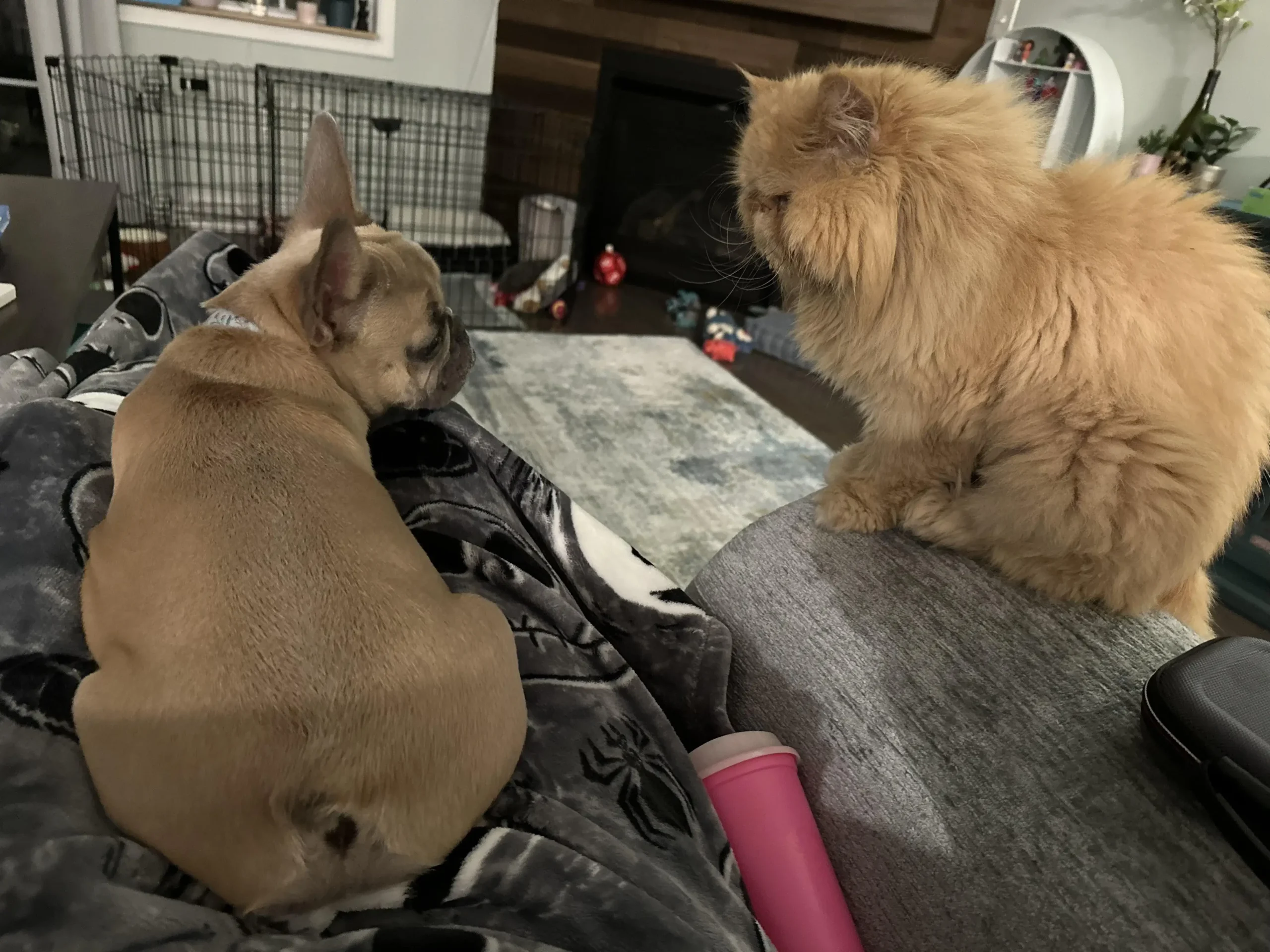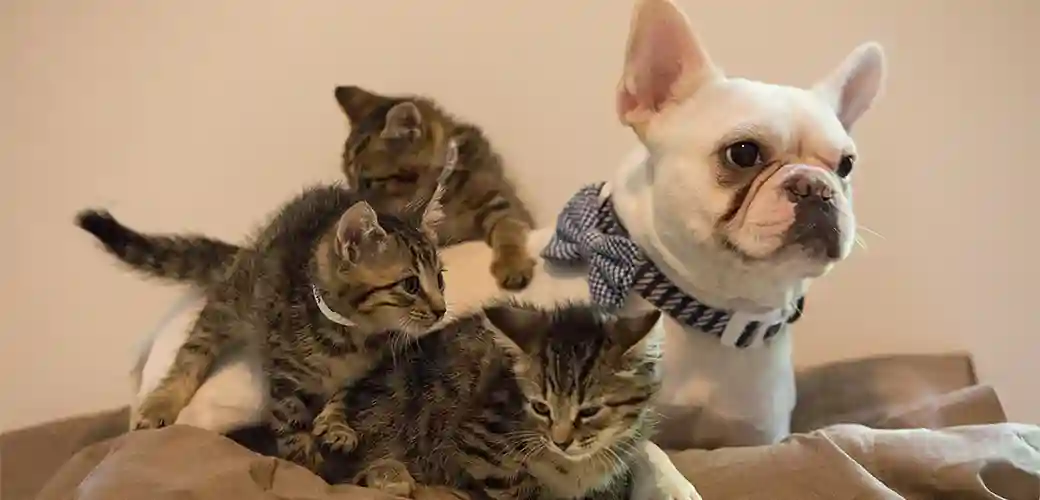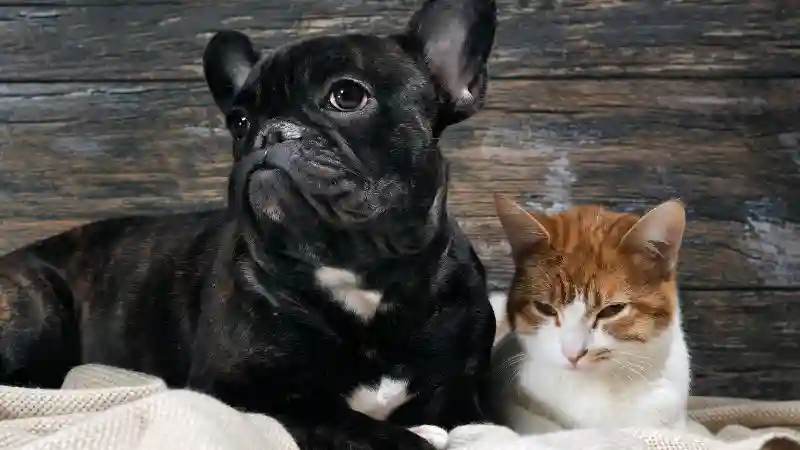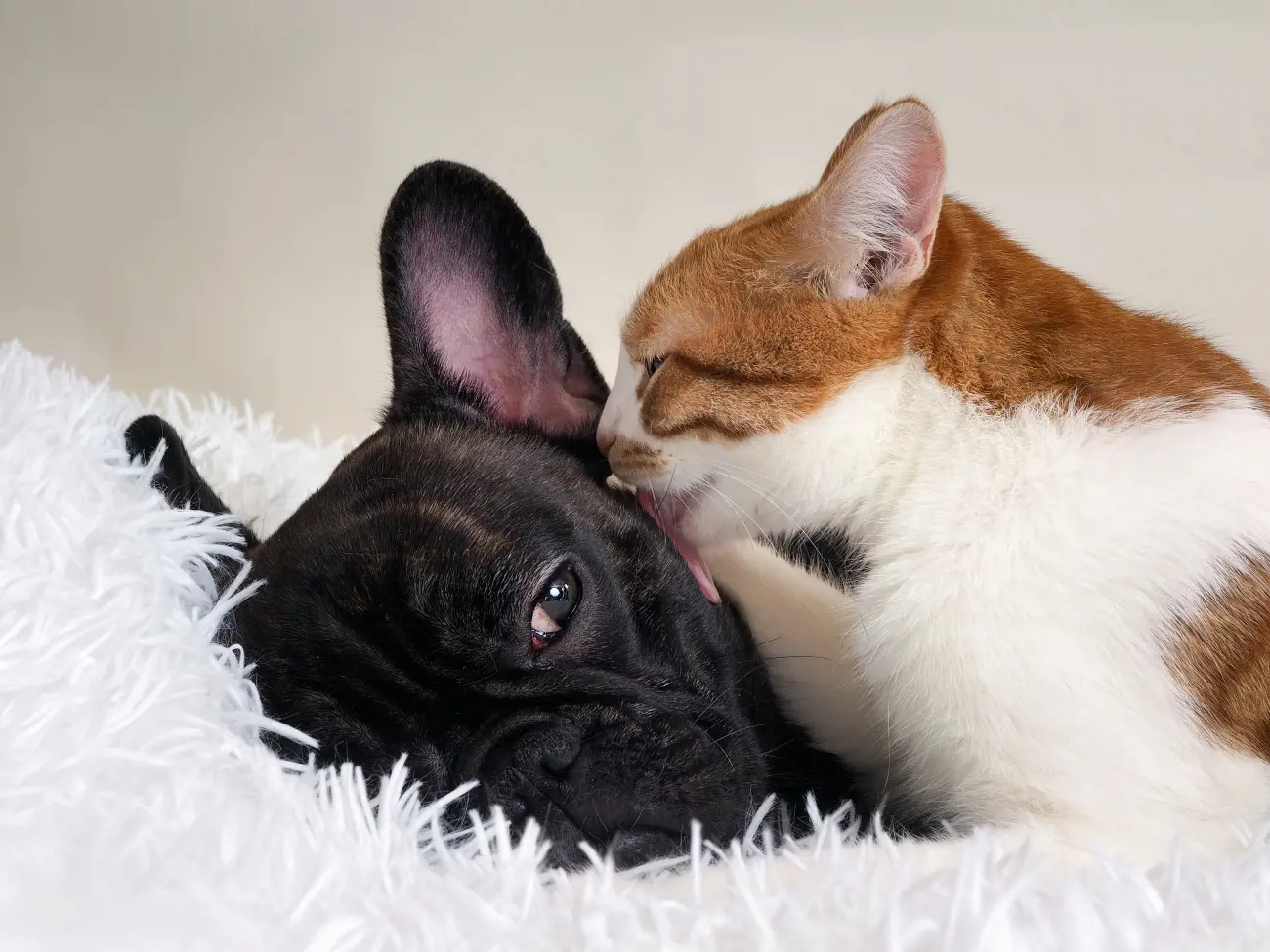Do French Bulldogs and cats get along ?

Frenchies have a great temperament and can get along well with cats, given proper introduction and socialization.
Whether you’re integrating a puppy and a kitten or bringing a new pet into your home with an existing Frenchie or cat, these steps ensure a harmonious relationship.
Learn how to navigate introductions, tips for cohabitation, and techniques for fostering a friendship between your Frenchie and cat.
How to Introduce French Bulldogs to Cats

Introducing a new French Bulldog to your feline companion can be a harmonious experience with the right approach. The process is smoother when pets are young, open to new experiences, and adaptable. However, introducing a new pup to an older cat might take more time to achieve mutual acceptance. Here’s a comprehensive guide on how to conduct a seamless introduction:
1. Separation is Key:
Begin by designating a specific room for your cat, allowing your Frenchie pup to explore the house. This period is crucial for them to become acquainted with the environment and, more importantly, each other’s scents. Gradually, let them adapt to the unfamiliar smells and objects. Keeping them apart initially helps in easing into their relationship.
2. Introduce a Barrier:
To initiate their interaction, employ a barrier such as a crate or playpen. Facilitate short and supervised intervals where they can see each other. Conduct this initial meeting in a neutral space, one that doesn’t favor either pet. Observe their body language and behaviors closely during these interactions. Reward positive behavior and avoid situations that lead to stress or aggression.
3. Barrier Removal – Supervised Interaction:
Once they display relative comfort, gradually remove the barrier and allow them to get closer. Close supervision is necessary during this phase. Watch for any signs of discomfort, stress, or uneasiness. If either pet displays signs of distress, separate them and try the interaction at a later time. Use treats and positive reinforcement to encourage their tolerance and acceptance toward one another.
4. Attending to Your Cat’s Needs
Upon Claude’s sudden arrival, Poopie, the cat, accustomed to her own space, found herself a bit unsettled by the new addition.
To ensure she didn’t feel neglected or threatened by this unfamiliar presence, we made a deliberate effort to give her ample attention and care.
5. Monitoring for Potential Issues
Observing for warning signs is crucial when integrating a new Frenchie into your cat’s environment.
Watch out for indications of aggression from your Frenchie or signs of stress in your cat. Cats might show distress by urinating indoors or losing their appetite, signaling a perceived threat to their territory.
Aggressive behavior like lunging, scratching, or biting between the pets may occur. If this happens (fortunately, a rare occurrence for us), it’s wise to give them a 24-hour break and keep them separated before attempting re-introduction.

What to Do If They Struggle to Get Along:
- Provide Separate Spaces: Offer each pet their designated area to retreat to when feeling stressed.
- Avoid Forcing Closeness: Let them interact naturally without imposing proximity.
- Discourage Negative Behavior: Redirect undesirable behavior and reward calm interaction.
- Consult a Professional: Seeking advice from a certified animal behaviorist can provide valuable insights and solutions for a smoother relationship.
With patience, encouragement, and careful monitoring, your French Bulldog and cat can gradually build a positive relationship, leading to a harmonious and friendly coexistence
However, what about encounters with other cats during walks?

When encountering cats belonging to neighbors or those during walks, it presents a slightly different scenario.Our Frenchie Pablo exhibits a natural curiosity upon spotting a cat in the neighborhood, much like his enthusiasm for little kids, people, birds, and even other dogs.
It’s not an exclusive fascination limited to cats.
He doesn’t harbor any ill intentions – not a trace of malice.His approach towards a strange cat is playful, not aggressive.
However, an incident occurred a few months back when a neighborhood cat, seemingly uninterested in his playful antics, scratched him deeply on the nose, perhaps due to a general aversion to dogs.

This led to a visit to the vet, reminding us of the potential risks. It’s essential to note that while your cat might get along with a Frenchie, another cat might perceive them as a threat, leading to an unfortunate confrontation.

Do French Bulldogs Get Along with Other Pets?
In my experience, this breed thrives when primarily alone. Their strong attachment to their human family and reluctance to share space suggests that while they can coexist with other dogs, they prefer not to. Successfully introducing new canine companions often requires a slow and cautious approach.
When raised together, Frenchies are likely to accept and get along with cats. However, their interactions with cats outside their home may not be as positive, even if they live with one. While they generally lack strong predatory instincts, the sight of a fleeing cat can prove too tempting for these relaxed and easygoing pups.

OTHER FRENCHIES OWNERS EXPERIENCES
I have a very submissive Frenchton and a very dominating Boston terrier. They are both fine with the cat. The Frenchton is actually slightly terrified of the cat even though the cat has never done anything to him to hurt him. The cat now knows this and does things to torment him like sitting in a room blocking the door. It’s pretty hilarious. The thing is, a lot of the times dogs and cats are perfectly fine together if they are introduced properly, well trained, and if you are prepared to manage the dogs behavior until it learns the cat’s boundaries. However if the dog has a strong prey/play drive it can be hard to train that out if they are determined to chase the cat. I wouldn’t discourage you from getting a dog but you just need to be prepared and have the ability to separate them when you need to. You also have to be able to separate litter and cat food from your dog at all times, because cat food and cat poop tend to be high value munchies for dogs.
My cat is around 10 years old, she is sweet but a scaredy cat. It took a long while before she would stop running and hiding from our Frenchy. And of course, once she showed fear, our Frenchy would lean into it and just chase her until she found a hiding place. It’s been over 2 years now and the cat gets along fine with the Frenchy, but they seem to have an agreement about which side of the house is theirs and they seem to abide by it.
French Bulldogs and Cats FAQs
Can French Bulldogs get along with cats?
French Bulldogs can coexist peacefully with cats, especially if they are introduced and raised together from a young age. Proper socialization and a gradual introduction process can help foster a positive relationship between a Frenchie and a cat.
Do French Bulldogs have a tendency to chase or be aggressive towards cats?
While every dog is unique, French Bulldogs generally do not have strong predatory instincts. However, their reactions to cats may vary. Some Frenchies may display curiosity or playful behavior, while others might be indifferent or reserved around cats.
How should I introduce my French Bulldog to a new cat in the household?
It’s crucial to introduce your Frenchie and the cat slowly and in a controlled environment. Start by allowing them to smell each other’s scent through closed doors and gradually progress to supervised interactions. Offer positive reinforcement, treats, and praise to encourage calm and friendly behavior.
What if my French Bulldog shows signs of aggression towards the cat?
If your Frenchie displays signs of aggression towards the cat, it’s essential to separate them and seek professional guidance from a certified animal behaviorist or dog trainer. Understanding the root cause of the aggression and implementing appropriate training techniques is crucial for resolving the issue.
Can a French Bulldog and a cat become close companions?
With proper introduction and positive experiences, French Bulldogs and cats can develop close bonds and become good companions. Some may even enjoy cuddling or playing together, although individual personalities and temperaments will influence their relationship.
Are there any precautions I should take when raising a French Bulldog and a cat together?
Supervision is key, especially during the initial stages of their interaction. Provide separate spaces for both pets to retreat to if needed. Additionally, ensure the cat has safe elevated spaces that the Frenchie cannot access, allowing the cat to feel secure
FINAL WORDS
In summary, nurturing a positive relationship between French Bulldogs and cats necessitates patience, gradual introductions, and careful observation of their interactions.
While successful bonding is possible, it heavily depends on individual personalities and a gentle introduction process.
Monitoring warning signs such as aggression or stress is crucial.
Seeking professional guidance from an animal behaviorist may be necessary if tensions persist.




